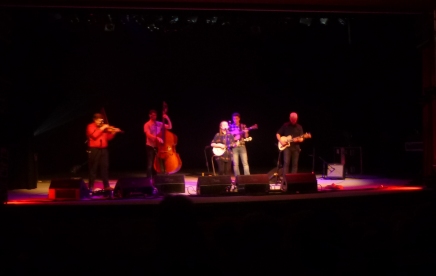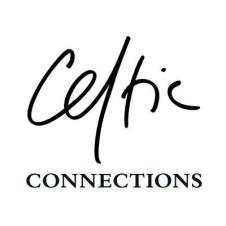
It’s somewhat telling of the immense amount of talent that descends on Glasgow for Celtic Connections that tonight’s show featured a full account of a 40 minute thematic song cycle from a “pop star” as the support feature. Sarah Hayes, best known for her work with indie band Admiral Fallow, is a classically trained musician and well regarded in folk circles. Her piece, Woven, was originally commissioned for Celtic Connections’ New Voices series in 2014 with Hayes releasing a CD of the work in late 2015, tonight essentially it’s its second debut if you will. With Hayes on keyboard and flute accompanied by fiddle, accordion, guitar, double bass, drummer and percussionist, she explained to the audience that they would perform the piece without a break, the way she intended it to be heard.
What followed was an intriguing, at times hypnotic and always interesting blend of songs and airs cloaked in tradition, some old, some new, interwoven with instrumental passages and a recurring motif most often played by Holmes on keys and then echoed by one of other of the instrumentalists. Unfamiliar with the piece it was easy enough to sit back and luxuriate in the musicianship, enjoy Hayes’ voice as she harked into the traditional songbook and roll with the flow and eddies as the piece lurched from accordion led melodies to flute interludes and some powerful percussive moments. It was a bold move, at times recalling those tense moments at a classical concert when the audience is unsure whether to applaud and indeed some audience members did suffer premature applaudication as the piece moved from one movement to the next. Nevertheless, there was no sense that this was a wish for the piece to end, merely a lack of bearings within the overall scheme. Having had a chance since to listen to the album and read about Hayes’ theme, weaving family, history, her Northumbrian roots and the weaving industry into one, we would contend that this is a classic piece, one that will grow in stature and going by the number of discs flying from the merch table after the show that growth starts from now.
After a short break headliner Jenny Ritter and her band had it all to do, a sense acknowledged by Ritter (who had watched the Hayes set from the front stalls) saying that she thought she should be the support act. False modesty however as evinced by the sheer delights she and her compadres unleashed for the next hour or so. With a new disc under her belt, the magnificent Raised By Wolves, simultaneously glacial, chunky, folk and country, an album that is both confessional and steeped in the wilderness of British Columbia, she proved up to the task. With fellow Vancouverians Adam Iredale-Gray and Ryan Boeur on fiddle and guitar (both from Fish & Bird) and New Yorker Nate Sabat on double bass Ritter handled banjo and guitar as she took us on a tour of the album.
From the opening Museum Song it was clear that Ritter is a fine songsmith, the words poetic, her voice light as her banjo rippled through the melody. Effervescent throughout the show Ritter spoke briefly about her upbringing in a log cabin before singing the excellent Wolf Wife, a song she described as being about seeing the world through different eyes. It’s a song that takes the listener into Ritter’s world of wonder where “there are things I do in dreams I would never do in life.” Perfectly borne aloft by Iredale-Gray’s pizzicato fiddle playing and Bouer’s tender electric guitar caresses it flowed sweetly by. Ritter remained in her inner hinterland for You Are Also Them, a more down home fiddle led number where she sang, “If I am a light in the dark and I am a road through the hills…I also know how to kill,” bowed double bass adding to the woody sound here.
Reminiscent at times of fellow Canadian Joni Mitchell in her invocation of nature Ritter was more upbeat on the “spaghetti western” twang of Turn Your Thoughts and on a duet with Iredale-Gray, an old song from their days in The Gruffs, Sharing Smokes. She revisited her first album, Bright Mainland, for a song written about her early days in Vancouver, Five Nights, the words evocative of the loneliness one can feel despite being surrounded by people but the highlights of the night were two powerful performances of the closing songs on Raised By Wolves. Remember The Life crept along with a crepuscular feel, Ritter’s voice carried to the night stars as Bouer’s guitar added some sinister sparks. Lost and Found was even better, an epic opening guitar sweep leading into this elegiac number, Ritter sounding forlorn yet hopeful as she sang, “I’m slowly sifting through some old debris and I’m throwing out what’s troubling me.” As on the album the song ended with the vivid portrait of an old piano laid to rest, notes turned into firewood even as the performance was chilling in its delivery.
Ritter ended with a fine chunky folk rock delivery of Neil Young’s Heart Of Gold and returned to lead the audience on We Must Sing, her tribute to the power of song. All in all a great performance.











